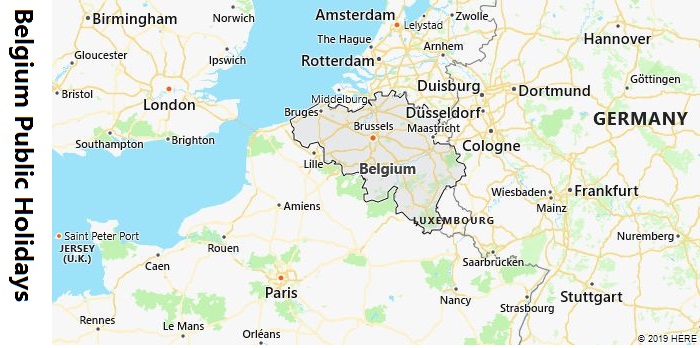Belgium Holidays
Belgium Public Holidays
Searching for the national holidays in Belgium? All public holidays in Belgium are treated like Sundays. This means that most of the Belgium employees have a day off and all schools are closed on these office holidays. If you are planning a trip to Belgium and want to know what the national and regional holidays are, check the details in the tables below.
List of Official Holidays in Belgium for Year 2020
| # | Date | Holiday | Day |
| 1 | January 01, 2020 | New Year’s Day | Wednesday |
| 2 | January 06, 2020 | Three Kings’ Day | Monday |
| 3 | April 12, 2020 | Easter Sunday | Sunday |
| 4 | April 13, 2020 | Easter Monday | Monday |
| 5 | May 01, 2020 | Labour Day | Friday |
| 6 | May 10, 2020 | Mother’s Day | Sunday |
| 7 | May 21, 2020 | Ascension Day | Thursday |
| 8 | May 22, 2020 | Bank Holiday | Friday |
| 9 | May 31, 2020 | Pentecost Sunday | Sunday |
| 10 | June 01, 2020 | Pentecost Monday | Monday |
| 11 | June 14, 2020 | Father’s Day | Sunday |
| 12 | July 11, 2020 | Celebration of the Golden Spurs | Saturday |
| 13 | July 21, 2020 | Independence Day | Tuesday |
| 14 | August 15, 2020 | Assumption Day | Saturday |
| 15 | September 27, 2020 | French Community Holiday | Sunday |
| 16 | November 01, 2020 | All Saints’ Day | Sunday |
| 17 | November 02, 2020 | All Souls’ Day | Monday |
| 18 | November 11, 2020 | Armistice Day | Wednesday |
| 19 | November 15, 2020 | German Community Day | Sunday |
| 20 | November 15, 2020 | King’s Feast | Sunday |
| 21 | December 06, 2020 | Feast of St. Nicholas | Sunday |
| 22 | December 25, 2020 | Christmas Day | Friday |
List of Official Holidays in Belgium for Year 2021
| # | Date | Holiday | Day |
| 1 | January 01, 2021 | New Year’s Day | Friday |
| 2 | January 06, 2021 | Three Kings’ Day | Wednesday |
| 3 | April 04, 2021 | Easter Sunday | Sunday |
| 4 | April 05, 2021 | Easter Monday | Monday |
| 5 | May 01, 2021 | Labour Day | Saturday |
| 6 | May 09, 2021 | Mother’s Day | Sunday |
| 7 | May 13, 2021 | Ascension Day | Thursday |
| 8 | May 14, 2021 | Bank Holiday | Friday |
| 9 | May 23, 2021 | Pentecost Sunday | Sunday |
| 10 | May 24, 2021 | Pentecost Monday | Monday |
| 11 | June 13, 2021 | Father’s Day | Sunday |
| 12 | July 21, 2021 | Independence Day | Wednesday |
| 13 | August 15, 2021 | Assumption Day | Sunday |
| 14 | November 01, 2021 | All Saints’ Day | Monday |
| 15 | November 02, 2021 | All Souls’ Day | Tuesday |
| 16 | November 11, 2021 | Armistice Day | Thursday |
| 17 | November 15, 2021 | King’s Feast | Monday |
| 18 | December 06, 2021 | Feast of St. Nicholas | Monday |
| 19 | December 25, 2021 | Christmas Day | Saturday |















































